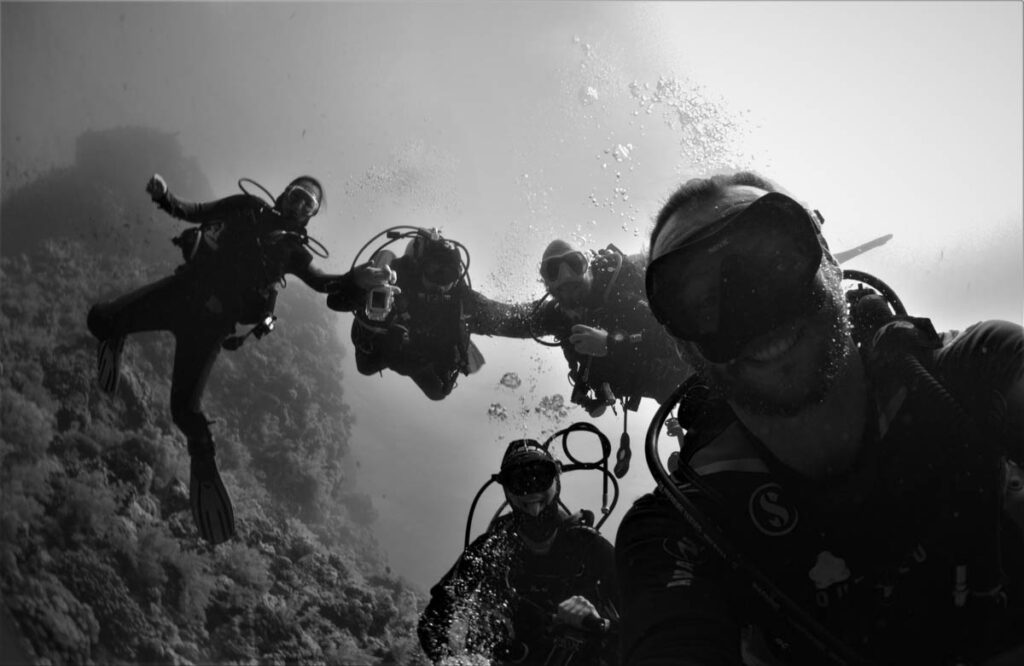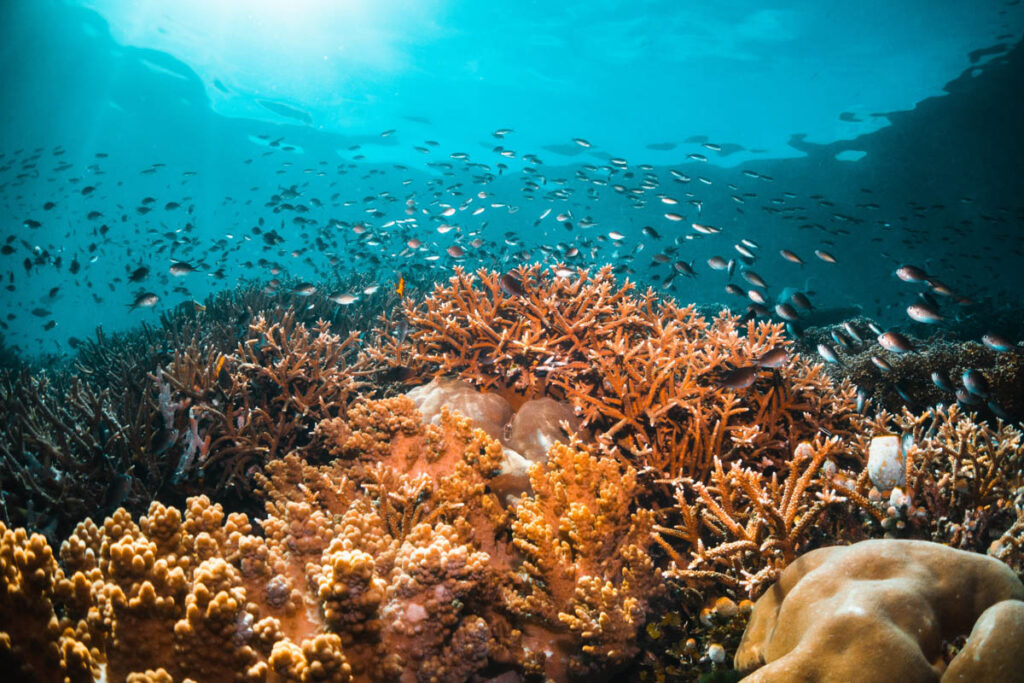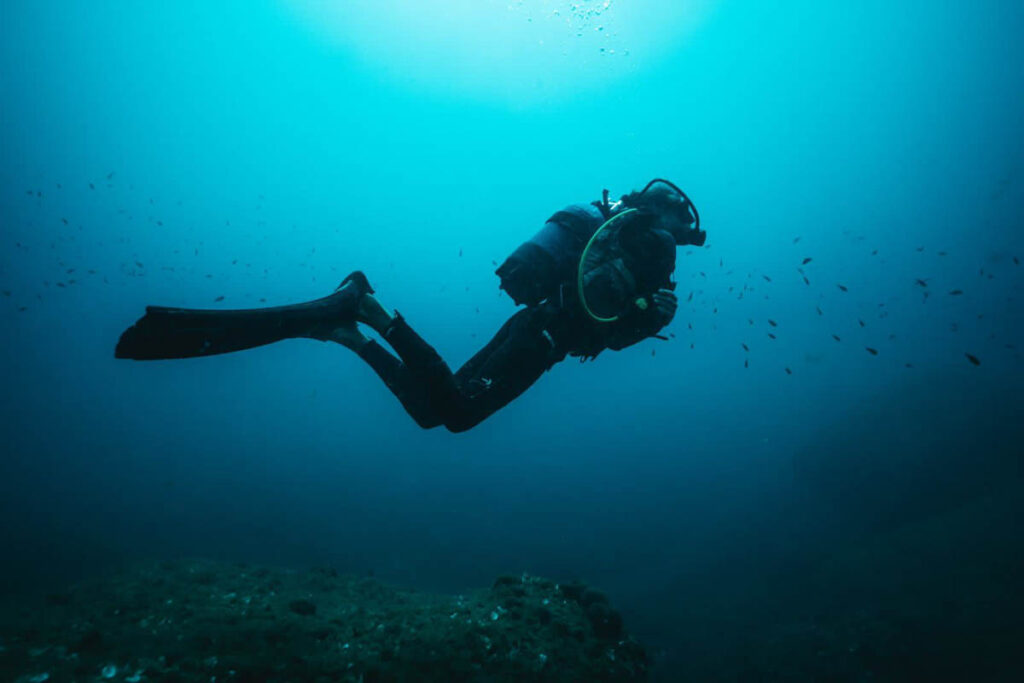The most common questions before people start scuba diving, answered by scuba diving instructors.
1. What Is Scuba Diving?
Scuba is an acronym for the system with which is used to stay underwater for extended periods of time – Self Contained Underwater Breathing Apparatus.
Recreational scuba diving equipment is made up of a buoyancy compensator device (or BCD), a regulator and an aluminium or steel cylinder containing pressurized air (oxygen, nitrogen, and other trace gases). Other equipment such as a mask, fins and a wetsuit are also key components to enjoying scuba diving.
Whilst this is the literal meaning, once you take your first breaths underwater, it will take on a whole new meaning to you. Experienced will tell you that each moment underwater is filled with awe, excitement and wonder, giving us access to otherwise inaccessible places.
2. How Deep Can You Scuba Dive?
Depth limits are set by the training agency that you qualify with. For example, with PADI, the world’s leading certification agency, Open Water divers are certified up to 18 metres, Advanced Open Water dives are certified to 30 metres and those with a Deep Diver Speciality, or professional level (Divemasters and Open Water Scuba Instructors) are certified up to 40 metres. A dive below 40 metres depth is not considered a recreational dive and should only be performed by trained divers. For those who don’t want to go all the way to 18 metres, there is also the Scuba Diver level, which you’ll be able to go up to 12 metres with a certified instructor.
Although they cannot be enforced, it is the responsibility of the individual, your dive buddy and the instructor or guide to ensure that the limits are not breached, for safety reasons. Practicing good scuba diving techniques will help with adhering to the recommended limits.
3. What Do I Need To Start Scuba Diving?
Scuba diving is an activity that requires proper training and certification from a recognized scuba diving agency, such as PADI or SSI. However, if you have never dived before, no worries! You can try it through the Discover Scuba Dive programme to see if it’s for you before embarking on your first diving course.
Basic swimming skills are necessary to enjoy scuba diving. You don’t need to be a professional swimmer, but you’ll need to learn how to tread water and swim at least 200 metres.
Besides that, just an appetite for adventure and seeing something new is all you need to bring. Your local dive shop will be able to provide you with equipment and an instructor to get you started.
Questions about breathing underwater? Want to start your adventures below the surface, but don’t know where to begin? Our Online Diving Course has everything you need to know, with tips and advice from top instructors to get you started.
4. How Long Does Scuba Diving Certification Take?
Trying it for the first time can take just a few hours. You will have a detailed briefing on the basic effects of being underwater and how to use the equipment. Then when you’re ready, spend 30-60 minutes diving.
The Open Water course can be done in as little as 3-4 days, or if you have other commitments then it can be spread out over a longer period. This is because it’s broken down into 3 parts: confined water training, open water training and theoretical learning. It’s completely up to you and your instructor.
The sooner you complete the certification, the sooner you can start diving the world! There are plenty of further courses and specialities you can take to increase your knowledge and skills underwater which, as you become more experienced, you can decide which ones are right for you.
5. What are the best scuba diving destinations?
It really depends on your preferences. Some like to explore the icy depths in places like the Arctic and Antarctic. In Iceland, you can even dive between 2 continental plates – check out this article by instructor and journalist Chantelle Wyatt
https://www.thescubanews.com/2017/06/15/snorkelling-silfra-with-scuba-iceland-2/
Coral Reefs, without a doubt, make some of the most beautiful dive sites. Teeming with life and colour (and usually, warm water) the beauty that can be seen on a coral reef is nothing short of miraculous. Truly a “see it to believe it” kind of place. Whilst it’s fairly common knowledge that coral reefs are under immense pressure and strain due to human activity, fortunately there are many places these wonderful ecosystems can still be seen including Australia, South and Central America, Maldives, Egypt, Indonesia and Thailand.
Find out more about Coral Reefs and the effects of Coral Bleaching: https://theoceantravelagency.com/diariesfromthedeep5/
One of the most fascinating things about scuba diving is that we can interact with creatures that are monumentally bigger than ourselves. Witnessing a pod of dolphins jumping and playing the wake of the boat, a 15 metre whale shark cruising past you underwater or a mother and baby humpback whale breaching the surface can be life changing, and it’s all possible through taking your first breaths underwater. Some of the places which are most renowned for seeing pelagic animals in their natural environment are Mexico, The Azores Portugal and Galapagos Islands.
The best time to visit these destinations can vary depending on the location and the type of diving you’re interested in, so it’s important to do some research and plan accordingly.
Read here: Manta Ray cleaning stations https://theoceantravelagency.com/diariesfromthedeep2/
6. Can Marine Animals Harm Us?
Marine animals, like any other animals, can present certain risks or dangers, but it’s important to understand that most marine animals are not inherently dangerous to humans. In fact, the majority of marine creatures are harmless and play crucial roles in their respective ecosystems. However, there are some marine animals that have the potential to be dangerous or cause harm under certain circumstances.
Here are a few examples:
Sharks:
Sharks are often misunderstood due to sensationalized media portrayals. While some species of sharks can be potentially dangerous, the vast majority are not aggressive towards humans and prefer to avoid interactions. Attacks on humans are rare, and most occur due to mistaken identity or territorial behavior. It’s important to note that responsible diving practices and understanding shark behavior can significantly minimize any potential risks.
Stingrays:
Stingrays typically have a docile nature and prefer to retreat rather than confront humans. However, they possess a venomous stinger on their tail, which they use for self-defense if they feel threatened or cornered. Accidental encounters or stepping on a stingray in shallow water can result in a sting, which can be painful but rarely life-threatening.
Jellyfish:
While the majority of jellyfish species are harmless, some possess stinging cells that can cause painful stings or, in rare cases, allergic reactions. It’s important to be aware of jellyfish presence in the waters you are swimming or diving in and take necessary precautions, such as wearing protective clothing or using appropriate protective measures like dive skins or stinger suits.
Moray Eels:
Moray eels have sharp teeth and can deliver a bite if provoked or threatened. However, they generally hide in crevices or coral and do not actively seek out human interaction. By maintaining a respectful distance and not provoking these creatures, the risk of encountering any issues is greatly reduced. It’s important to remember that when we go underwater, we are guests, and so we must treat it like we would if we were going into anyone else’s home. Be careful of your surroundings, being careful not to touch or kick anything with your fins, to not disturb the animal life in an abusive way, and to respect the surrounding environment. Practicing good dive skills that you will learn throughout your journey can help you have better interactions with marine life, and greatly reduce the chances of being injured.
7. Is Scuba Diving Dangerous?
Like all sports, there are inherent risks when it comes to scuba diving. Fortunately, with the right training and attitude, they can be easily avoided. It’s important to remember that millions of people worldwide are getting certified to scuba dive every year, and as it becomes an increasingly popular activity by people of all ages, so do the safety protocols, as does the scientific knowledge.
Some of the potential risks include:
Decompression sickness:
Also known as “the bends,” decompression sickness can occur when a diver ascends too quickly and nitrogen bubbles form in the bloodstream.
Barotrauma:
This occurs when there’s a pressure difference between the inside of a diver’s body and the surrounding water, which can cause ear pain, sinus pain, and other issues.
Entanglement:
Divers need to be aware of their surroundings to avoid getting trapped or tangled in underwater structures or debris. Of course, there are some marine animals which can also give us a problem, however by not disturbing them and causing them any harm, there’s no reason that anything would cause you harm.
During our Online Diving Course, we go into a bit more detail about how to take care when diving and to minimize the risks so you can safely enjoy the sport. With the right training and guidance, you will learn how to best prepare for any dive and minimize the risks.
Feel free to ask us any questions you might have about these or other dangers you may have heard of by sending us a message.
8. How Do I Prevent Ear Pain Whilst Diving?
Ear pain is a very common issue with divers, and one that is easily avoided by following a few simple steps.
This is caused by pressure of your surroundings (i.e. the water) changing compared to the pressure in your body (i.e. the ear). Have you ever been on a plane? When it starts to go up, you often have to suck on a hard sweet, or chew some gum? Well, the same thing is happening underwater. Unfortunately, as we can eat anything down there, there are a few other ways to solve the problem.
The quickest method is to gently pinch your snows and blow softly. You should feel a small pop or change in pressure in your ears, and that is called equalizing. It’s important not to blow too hard so you don’t injure yourself. You can also try swallowing which works for some people, but not everyone.
Your instructor will give you more advice on this and you’ll be able to practice it before you dive. After a couple of times, it will become completely natural, and you’ll be doing it automatically.
9. Can I Scuba Dive If I Have Certain Medical Conditions?
If you have some pre-existing medical conditions, it’s quite possible that you can still learn to scuba dive. Before beginning any scuba dive adventure, whether it is your first or 100th, you will need to sign a medical declaration. It’s a Yes/No questionnaire that will inform the instructor or guide any conditions you have or medications you are taking.
If you have had any treatments or surgery in the past, or are currently taking any medication for whatever reason, it’s very important to visit your GP or local doctor and ask them if you are ok to scuba dive. Whilst most people are completely fine to scuba dive, there are certain things that may prevent someone diving safely due to their medical history, so it’s super important to find this out before you go to avoid any disappointment on the day, or to put yourself or others at any risk.
10. Where Can I Learn To Scuba Dive?
If you’re unsure if scuba diving is still for you, we recommend our Online Diving Course which aims to answer any questions you may have through the knowledge and experience of our team of instructors and dive professionals.
For those who are ready to get in the water and make some unforgettable memories, you’ll be thrilled to learn that there are thousands of places which you can learn to dive. Whether you want to get certified on holiday, or in the place you live, it’s likely there is a dive shop not too far from you! Fortunately, we have had the pleasure to work with many dive centres and teachers all over the globe, so if you’re ready to start learning, get in touch with us and we can help arrange your first diving experience!








